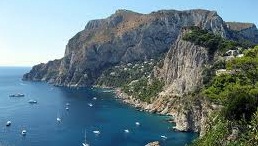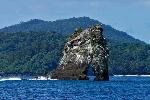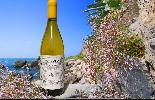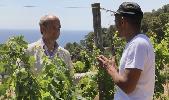Wein von Gefangenen
Hoch auf einem Hügel über dem Meer in der kleinsten Insel (2 Quadratkilometer) und der nördlichste der sieben Inseln des Toskanischen Archipels, wo Männer arbeiten unter der Sonne in einem Weinberg von nur aus Marketing ein Weißwein, 50 Euro pro Flasche. Aber es ist nicht eine majestätische Weingut, kein Luxushotel, trotz der Schönheit der Landschaft. Es ist die erste Übersee-Strafkolonie in dem Land, die Heimat von Menschen verurteilt zu langen Haftstrafen für einige der berüchtigtsten und brutalsten Verbrechen in Italien begangen.
 Gorgona Island, with its 220 inhabitants, is the seat of a rehabilitation project of the worst criminals through agriculture. Around 1525 or 1527 was "discovered" by the Spanish Diego de Almagro and then by Francisco Pizarro baptized with the name of Gorgona, inspired by the woman whose head was covered with snakes, a character of Greek mythology, as in the island poisonous snakes abounded.
Gorgona Island, with its 220 inhabitants, is the seat of a rehabilitation project of the worst criminals through agriculture. Around 1525 or 1527 was "discovered" by the Spanish Diego de Almagro and then by Francisco Pizarro baptized with the name of Gorgona, inspired by the woman whose head was covered with snakes, a character of Greek mythology, as in the island poisonous snakes abounded.
The island penal colony since 1869, produces about 2,700 bottles of white wine called Castello Vecchio of Gorgona with the help of an Italian wine dynasty enjoying seven centuries of experience. The approximately 40 prisoners, also produce pork, vegetables, chicken, olive oil and cheese, all of high quality. The two men in the vineyard, and Francesco Baladassin Brian Pope, serving long sentences for murder and earned a move to Gorgona after spending years in other prisons.
Higher still the vineyard, the Sicilian Ceraulo Benedetto, 55, works between shelves full of cow milk cheeses and goat, including a 'ricotta' or cottage delightfully light. Ceraulo was convicted in 1998 for being the executor of one of Italy's most sensational crimes: the murder of Maurizio Gucci, the last member of the family created the fashion empire, by order of his ex-wife.
The Gorgon vineyard was planted in 1999 but later abandoned. In 2009 a prisoner, now already released, along Prinzi and Pope, recovered strains. In 2012, the dynasty of the Marquis de Frescobaldi sent experts to improve cultivation and direct the vineyard and the vintage year. Lamberto Frescobaldi, belonging to the thirtieth generation family winery's technical director, said the one-hectare vineyard is ideally situated, facing east, which receives only morning sun, and on a mineral-rich soil.The Frescobaldi, pay a salary to the prisoners and then sell the wine.
The warden of Gorgona, Maria Grazia Giampiccolo, is known for its progressive methods, and also runs a prison located inside a fortress of the Medici in the Tuscan town of Volterra, where inmates offered 'Inmate Dinners' with the help of chefs local. Giampiccolo is outspoken supporter of leading the prisoners to the work world, building relationships with companies abroad.









